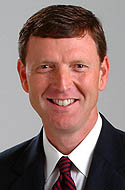Faith in Politics: Iowa leaders agree politicians can damage image of religion
Iowa political leaders generally agree religion sometimes gets a bad name because of how politicians use it.
Jul 31, 202023.1K Shares3.3M Views
Iowa political leaders generally agree religion sometimes gets “a bad name” because of how politicians use it.
Faith plays an important role in politics across the nation, but maybe more so in Iowa. A recent poll from NBC News/Marist shows 91 percent of potential Republican caucusgoers in the state identify as either protestant or Catholic. Of those, 40 percent consider themselves fundamentalist or evangelical Christians.
That same poll also shows potential Republican caucusgoers place more importance on whether a candidate shares their values than their stances on issues, experience or electability. Thirty-one percent identified shared values as the most important quality of a presidential candidate, compared to 29 percent for stances on issues, 19 percent for governing experience and 18 percent for ability to defeat President Obama in 2012.
Sen. Matt McCoy(D-Des Moines) said he’s been disappointed by not only politicians using religious institutions but also religious institutions that allow themselves to be used by politicians.
“I think when religious institutions – and I put the Catholic Church in this mix – when they allow themselves to be used by politicians, shame on them,” said McCoy, who is openly gay. “Because ultimately they’re only as good as their ability to be pure and free of being used. I think a lot of churches have gotten way too political and allowed politicians to use them in their platforms to launch these political careers.”
Bob Vander Plaats
McCoy said both politicians and churches have become “equally offensive” in the way they’ve been acting lately, and he and many others see a “a great deal of hypocrisy in religion, period.”
“Then when politicians embrace it and people like Rick Perry do these Evangelical events all around politics and religion, I just think there’s a lot of distrust for organized religion,” he said. “I think organized religion in general has both a lot of good and bad attributes.”
Bob Vander Plaats, a three-time Republican gubernatorial candidate and head of the socially conservative advocacy group The Family Leader, said it all boils down to whether politicians that champion religion are truly authentic in their belief and actions.
Image has not been found. URL: http://media.iowaindependent.com/connie_ryan_terrell_125.jpgConnie Ryan Terrell
“Do you live the lifestyle or do you just talk the lifestyle?” Vander Plaats said. “I think there’s a lot of ways where Christians have been a great model for the lord and savior that they serve and there’s others, probably myself included too many times, where we’re a deterrent to some of those things because of how we’re viewed or we’re not perfect.”
Connie Ryan Terrell, head of the Iowa Interfaith Alliance, said religion can get a bad name because of how politicians use it. But she thinks most Americans are “relatively politically savvy” and can see past that.
“But I think when candidates misuse religion and insert their own religious beliefs of doctrine of politics, then I think it can give religion a bad name,” she said. “But really more importantly it gives politics a bad name because it’s been misused.”
Rep. Kim Pearson(R-Pleasant Hill) said it’s important to remember “Christians aren’t perfect” but are “fallen, redeemed people.”
“There are times when our own sinfulness will cause people to blasphemy God, and then you’ve also got people that don’t sincerely hold the belief and will say whatever they need to to get elected,” she said.
(Editor’s note: This is part three of the “Faith in Politics” series. In part one we examined how Iowans hold different views on the role of faith within politics. In part two Iowans discuss how religion is sometimes exploitedby those in politics.)

Camilo Wood
Reviewer
Camilo Wood has over two decades of experience as a writer and journalist, specializing in finance and economics. With a degree in Economics and a background in financial research and analysis, Camilo brings a wealth of knowledge and expertise to his writing.
Throughout his career, Camilo has contributed to numerous publications, covering a wide range of topics such as global economic trends, investment strategies, and market analysis. His articles are recognized for their insightful analysis and clear explanations, making complex financial concepts accessible to readers.
Camilo's experience includes working in roles related to financial reporting, analysis, and commentary, allowing him to provide readers with accurate and trustworthy information. His dedication to journalistic integrity and commitment to delivering high-quality content make him a trusted voice in the fields of finance and journalism.
Latest Articles
Popular Articles
